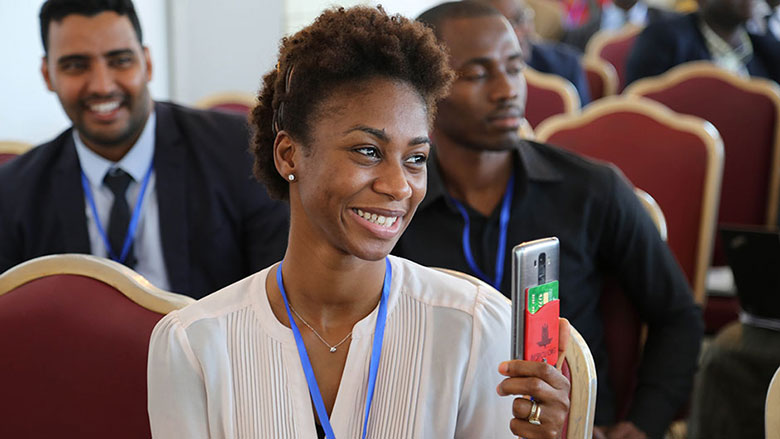Ba’s hip-hop center, Africulturban is situated in Dakar’s most populated and poorest suburb, Pikine. Since 2006, it has been able to nurture the creative potential of the suburb’s young unemployed in order to expand their horizons, provide them with music and media training, instill leadership skills, offer performance gigs, and help them discover new fields of work. On a continent where the burgeoning youth demographic outnumbers job vacancies, initiatives like these are beacons of hope and opportunity for youth and present viable solutions to the employment equation. Not only are they run by youth and tapping into the potential of the creative industry, but they are also developing and promoting the abilities of their fellow peers.
In fact, the event, entitled “Youth Forum on Employment, Training, and Inclusion: A Knowledge-Sharing Event for Sub-Saharan Africa”, was a way to bring as many stakeholders as possible to the table to actively discuss and exchange on a set of priority actions that can be taken in the participating countries* to improve the education, economic, and social prospects of young Africans. “Youth unemployment is a universal challenge. In sub-Saharan Africa, it requires a pertinent strategic approach that applies inclusive and adapted measures targeting triggers of growth and employment to ensure a better insertion of youth in the economic fabric of our respective countries,” expressed Mame Mbaye Niang, Senegal’s minister for Youth, Employment, and Civic Construction, during the forum.
“Ensuring that all youth have a path to be included in society, regardless of their gender, location, and socioeconomic status, is a key priority shared by all participant countries. The forum explored various avenues including the role of informal apprenticeship in building skills, the role of social media and new technologies in connecting youth to jobs, and the role of sports and cultural activities to provide an means for inclusion for marginalized youth”, explained Raja Bentaouet Kattan, World Bank Program Leader in Senegal.
Moving forward, forum participants concluded that it is critical for countries to address the skills and jobs mismatch, barriers to private enterprise, access to credit and land for youth entrepreneurs, and the improvement of basic infrastructure to promote greater productivity.
There was also an emphasis placed on finding ways to better integrate and empower youth who were not able to complete their education and who struggle to find gainful employment. « Without work to anchor them, these youth might be tempted to migrate or join extremist movements,” remarked Louise Cord, World Bank Country Director for Senegal, Mauritania, Cabo Verde, Guinea-Bissau, and the Gambia.
Presentations by World Bank staff Emanuela DiGropello, Program Leader, and Aline Coudouel, Lead Economist, spoke to this issue highlighting the importance keeping youth in school and remedial training. “The World Bank has been supporting skills development opportunities to vulnerable out-of-school youth across the continent as well as strategies to facilitate their transition to the labor market, particularly through entrepreneurship”, noted DiGropello.
For Amadou Fall Ba, Africulturban has taken these priorities to heart, going as far as launching a program for former juvenile inmates that provides them with multimedia training, French and English language skills, mentoring, and social skills to ensure a smoother transition back into society. “It’s not only about finding young people jobs, it’s also about youth creating jobs. By investing in and creating a demand for urban culture, we are also opening the door for new jobs such as videographers, sound technicians, light technicians, photographers, and music video editors,” said Ba.
The two-day forum, which opened with prominent Senegalese rappers Xuman and Keyti setting the scene of Africa’s current youth employment challenges, and wrapped up with a live performance from theatre troupe “Hope from the Suburbs” – was more than just an institutional knowledge exchange. It was the chance for governments, development partners, and educators to be inspired by a dynamic demographic that is not looking for handouts, but rather for strong partnerships that will ensure a more promising future for Africa’s generations to come.
*Forum participants hailed from Benin, Togo, Cote d'Ivoire, Mauritania, Senegal, Cameroon, and Republic of Congo.

